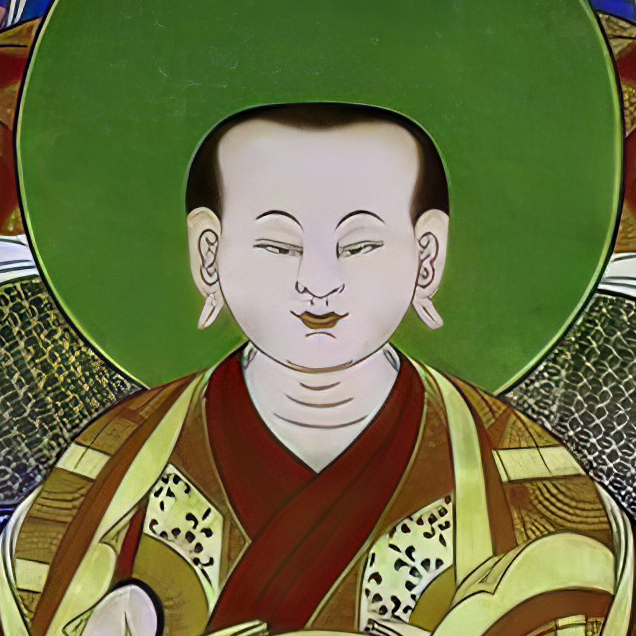The suffering of self-cherishing and the merits of cherishing others
1. The foundation of the great perfection – Bodhicitta
1.2 The suffering of self-cherishing and the merits of cherishing others
Due to the incorrect belief in attachment to phenomena as being truly existent, sentient beings in samsara generate the habit of self-cherishing. This in turn gives rise to the five poisons: greed, anger, ignorance, pride and jealousy. This brings us endless suffering, life after life.
Wherever we go and whatever we think about is directed at our own self-importance, even when we dream. As a result we try to use whatever means to feed this attachment to self. We eat, drink, and entertain for our own sake. We lie and kill for the sake of ourselves. We deceive others for the sake of ourselves. We protect those close to us, our loved ones, while we attack our enemies. Whenever there is some benefit, we make sure that we are in the front of the queue, and everybody else is less important than us. What we need, other people are not allowed to have: our desire, our pursuit of material things, and our quest for pleasure is never satisfied. The greater our craving, the more we grasp. The more we grasp, the more severe is our present and future suffering. Since we have so many cravings, whenever we are not satisfied we think that it is due to the external world, that other people are creating all sorts of trouble for us. From this, all sorts of afflictive emotions arise, such as hate, blame, frustration, disappointment. When we attain some form of satisfaction, then we look down on others and consider them inferior. Pride will not create any merit for us. When other people excel, we become jealous. Jealousy will never allow our mind to be at peace. The reality is that it is not the external world that is unfavourable, rather problems arising from our own state of mind. It is just like someone who is suffering from yellow jaundice. Everything that is white they see as yellow but it is they who are mistaken. With this confused attitude, we feel that things we encounter are inauspicious, that life is unfair, and we are often unhappy and dissatisfied.
What we seek is more happiness; however, in reality we are desperately moving in the opposite direction, towards suffering. This inverted way of thinking and acting not only brings about negative influences in this life, since cause and effect are truly infallible, but after our death this attitude will bring about even greater harm. Whatever negative actions of body, speech or mind that we perform when we are alive, we will definitely have to repay many times in future. When the causes and conditions come together, so too will the price of our greed, anger, and ignorance.
In addition, some people may accumulate positive deeds with a mind of self-cherishing. For example, they release animals in the wish for a long life for themselves, and make donations or offerings for the sake of their own future worldly merits. People who practise like this believe that these actions could secure them some virtuous merits, so that in their next life they will not be born into the three lower realms, and that at the end of their life they will go to Sukhavati (Land of Great Bliss), where they can enjoy the supreme happiness of nirvana just for themselves. This type of practice is motivated by their own selfish interests, and is therefore no different to the worldly pursuit of happiness and enjoyment, as performed by people living in the mundane world. The motivation that all practices are essentially for the benefit of one’s own good is what we call self-cherishing. If a practitioner cannot let go of this grasping mind, it will not be possible for them to attain perfect and everlasting happiness.
The self-cherishing mind has one natural enemy, which is the mind that cherishes others. When we hurt other people, it is the same as hurting ourselves. When we make other people happy, it is the same as cultivating our own happiness. Just as Shantideva said, “No matter what type of happiness there is in this world, it comes completely from wishing for the happiness of others; no matter what type of suffering there is, it comes completely from wishing for our own selfish happiness. Young people pursue their own selfish interests, while all the Buddhas pursue the interests of others. If we do not substitute the suffering of other people for our own happiness, we have no way to attain Buddhahood, and in samsara we will never attain true happiness.”
Although the inherent nature (rigpa) of a Buddha and that of sentient beings is fundamentally the same, with the mind of cherishing others, the Buddha was able to give rise to boundless merits, and cut through all afflictions and defects within samsara. However, unlike the Buddha, we follow our own self-cherishing, habitual tendencies, and bring great afflictions and sufferings upon ourselves in this life and in the life to come.
Once we understand the perils of self-cherishing and the merits of cherishing others, as we listen to and contemplate the teachings of the Buddha, we must, with determination, make up our mind to transform this self-cherishing way of thinking. We have to modify our negative attitudes and actions in a gradual manner and conscientiously cultivate a mind that cherishes others. The more we think about ourselves, the less it occurs to us to benefit others; whereas, the more we want to benefit sentient beings, the less we tend to entertain our own selfish minds. In this way, our attachments and afflictions will be reduced. With the help of this mind that cherishes others, our compassion will naturally grow and our afflictive emotions will decrease.
This chapter is part of: Introduction Course - Part 2: Bodhichitta
